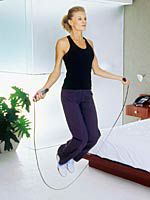Getty ImagesEver wonder why you feel so great after you break a sweat? Turns out, exercise isn't just an effective flab-fighter—it's a remedy for pretty much any troubling health issue you are facing: anxiety, insomnia, back pain—even hot flashes. "When it comes to preventing health problems, exercise is one of the best medicines we have," says David Katz, MD, founding director of the Yale University Prevention Research Center. But some workouts are better than others for healing what ails you. Try these active solutions.
Anxiety
A proven way to ease anxiety naturally is with a bout of cardio, says Michael Otto, PhD, co-author of Exercise for Mood and Anxiety. Getting your heart pumping increases the release of mood-stabilizing neurotransmitters, like serotonin, norepinephrine and GABA, which is why you can feel like you're sweating off stress during Spinning class.
The good vibes continue: A study in the journal Medicine & Science in Sports & Exercise showed that doing 30 minutes of moderate-intensity exercise (jogging, not sprinting) makes you more resilient against stressors hours later, like preparing for that big meeting with your boss. And over the long term, "people who work out consistently report less overall stress, anxiety and depression," Otto says.
Your fitness Rx: Do a quick blast of cardio on the morning of a hectic day, or to unwind at the end of one. If possible, take it outside—numerous studies show that fresh air provides a big mood boost.
Daytime sleepiness
Instead of leaning on caffeine (which can prevent you from falling asleep later, causing drowsiness again the next day), get moving. Folks who meet the recommended physical activity guidelines of 150 minutes a week are 65 percent less likely to feel tuckered out during the day, a 2011 study found. "Exercisers fall asleep faster, suffer fewer middle-of-the-night wake-ups and have a reduced risk of sleep disorders," says study co-author Brad Cardinal, PhD, co-director of the sport and exercise psychology program at Oregon State University.
Translation? You'll snooze more soundly and feel more energized on the go. "We aren't sure why activity primes your body for sleep so well, but it's likely a combination of factors, including lowering your core body temperature, increasing the sleep-promoting hormone melatonin and supporting a biological need to restore energy levels and repair cells and tissues when you sleep," Cardinal says.
Your fitness Rx: Aim for 150 minutes per week of moderate activity. Try to work in some yoga; a 2012 study found that practicing yoga along with deep-breathing techniques relieved insomnia within four months. Wrap up your workout at least three hours before you hit the sack: Exercise can be too stimulating near bedtime.
Back pain
The supporting muscles around your spine become less resilient with age; sitting hunched over a computer all day weakens them further. But the new thinking is that rest isn't usually the answer. "Research has shown that a better fix, in most patients, is strength training," advises Wayne Westcott, PhD, an exercise scientist at Quincy College in Massachusetts. "It can lessen pain by 30 to 80 percent in 10 to 12 weeks." Developing your lower-back, abdominal and oblique muscles takes pressure off your spine and improves range of motion, both preventing and treating pain.
Your fitness Rx: Two or three days a week of strength-training exercises, focusing on major muscle groups (try the chest press, leg press and seated row) and lower-back and ab work (the lower-back-and-ab machine). Aim for 2 to 4 sets of 8 to 16 reps each.
Next Page: Low sex drive [ pagebreak ]
 fitness-self-esteem can improve immunity. Good options: Jog, cycle or take a dance class. Or, try a circuit workout (with little or no rest in between exercises) for 30 minutes on most days of the week. (Avoid intense exercise beyond 90 minutes, since that can increase your risk of getting sick.) That little commitment is all you need to score a big health payoff.
fitness-self-esteem can improve immunity. Good options: Jog, cycle or take a dance class. Or, try a circuit workout (with little or no rest in between exercises) for 30 minutes on most days of the week. (Avoid intense exercise beyond 90 minutes, since that can increase your risk of getting sick.) That little commitment is all you need to score a big health payoff.
